
It is said that chess is a game for smart and intelligent people. Some people are born with it, or at least have a basic instinct, while others develop their skills step by step. The game is definitely not for everyone and it brings in a plethora of advantages – mostly over your brain. It takes time and it develops slowly, but it brings in great satisfaction. It involves planning moves way ahead of time – nothing but pure strategy. If you are just getting into this world, here are some of the best chess books for beginners.
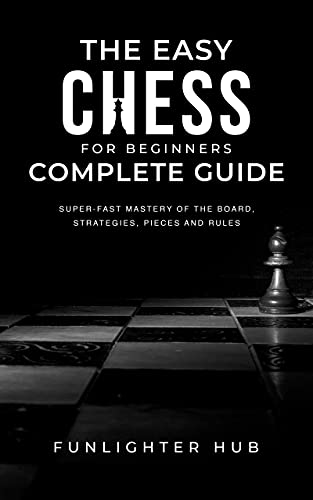
The Easy Chess for Beginners Complete Guide, by Funlighter Hub
Learning chess may seem like a real challenge, but these people make it all simple. You want to learn the game and you know the basics, but what about strategies for newbies or general unwritten rules? This is when this book kicks in to make your life easier. It will take you from A to Z and it will explain everything in easy-to-follow tutorials – step-by-step instructions.
The Funlighter Hub is not new at all. Its members have been teaching newbies how to master chess for years. This book simplifies everything and allows you to learn the easy way. There are more than 100 chess diagrams to help you understand the game, not to mention some less known things about rules, pieces and the actual board.
Discover the benefits of playing chess, a few sacred principles of this game, various strategies to implement throughout the game, closing tactics to ruin your opponent and a few crucial checkmates. Learn about offense and figure out how to develop your own strategies, but also analyze the key principles associated with your defense – basically, you got everything in one comprehensive manual.
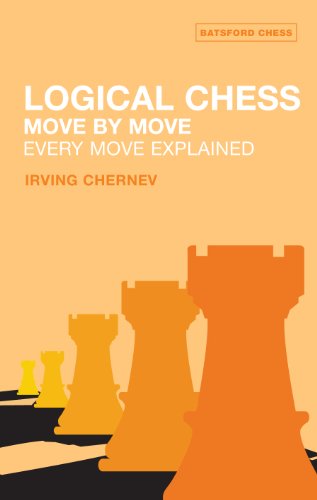
Logical Chess, by Irving Chernev
Developing a few strategies in chess is essential, but chances are a good opponent may already be aware of them. At this point, you might feel lost. You have failed to anticipate your opponent’s moves and chances are you will be surprised by their attacking tactics. This is what real players do – after all, the game is quite logical and implies switching strategies throughout a match.
Learning a few strategies and moves will help against a newbie, but not against a good player. In other words, you need to learn to adapt. This is when the logical profile of the game kicks in. Your opponent goes in a different direction, so you have to follow up and surprise them. How do you improve then? This book is a classic and one of the best chess books for beginners.
The author makes this book fairly simple. Practically, you are taken through 33 different games. They are explained in the smallest details. You understand how a professional player sees the situation and adapts. Every move is explained. Going through them a few times will put you in similar situations later on, so you will know precisely what to do.
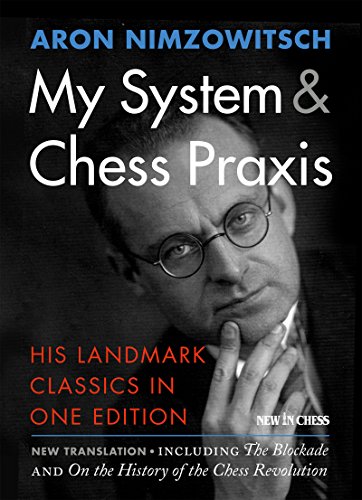
My System, by Aron Nimzowitsch
Aron Nimzowitsch is one of the most reputable chess players in the world. For many years, he was one of the most successful players out there. His theories and ideas were almost impossible to decipher, as he seemed to adapt in such a quick manner that no one would guess his next moves. Today, everyone has access to his system and theories due to his will to share the system.
As you go through the book, you will discover some well-known principles of chess that you may already be aware of. Furthermore, you will discover these techniques have been improved in a personal way to make things easier and more efficient. Some of them could be a bit difficult to understand at first, but going through them a few times will help you implement them in no time.
The book describes a unique theory of chess – the author’s own system. It also goes through his character and his thinking whenever unexpected situations arise. Furthermore, the book is written in an easy to understand way. It is straightforward and filled with many moments of witty humor and detailed explanations – what else can you ask for?
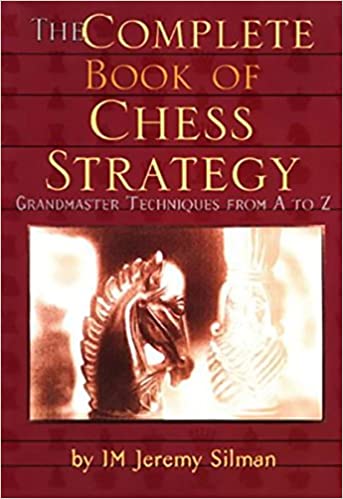
The Complete Book of Chess Strategy, by Jeremy Silman
You know what each piece does and you know the moves, but you get stuck when it comes to trying out various strategies or perhaps developing your own. All the information you find over the Internet is scattered and less likely to help too much. How do you come up with your own strategy then? Learning from the best is usually the best way forward.
This book is extremely simple to understand and excellent for beginners. It introduces the reader to conceptual planning. Every amateur hopes to get there, but few manage – this book makes it easier. The guide is given in a dictionary form and represents the first book of this kind. It helps readers understand every aspect related to chess strategies. It makes no difference how clueless or advanced you are – there is something out there that will lighten your experience in no time.
Every single strategic concept is given in an alphabetical order. It is then explained in small details, but is very easy to understand. Moreover, there are a few examples to help you understand how each concept works. You will discover concepts and ideas used by some of the greatest players in the history, from Fischer and Capablanca to Petrosian and Steinitz. It takes time to incorporate each concept, but it is totally worth it.
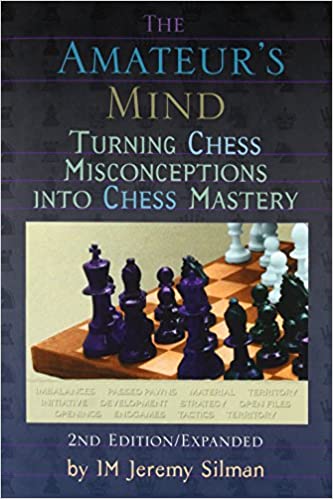
The Amateur’s Mind, by Jeremy Silman
This is one of the best chess books for beginners and a must-read for every amateur out there. It will not give you world-renowned strategies that everyone is trying to implement. It will not give you some champions’ strategies and systems that are widely advertised for. Instead, it takes you through a journey to your own mind and returns you to the game with a ton of extra knowledge. Basically, it boosts your own brain and pushes you to develop your own playing style.
Most beginners out there feature their own thinking processes. No matter how much they learn or study, these processes will stick to their minds. These are their own styles and while they can read various books to expand their thinking ways, such problems are quite hard to eradicate. Indeed, they may not be too visible at a first glance – someone might notice them as you play against them, but this is pretty much it.
The author takes a different approach to chess. As a chess master, he has taught lots of students overtime. He has seen everything in this game while analyzing his students. He brings up some of the most common issues among amateurs, as well as the most popular misconceptions. He aims to clear them by teaching newbies how to analyze themselves and clear them out by themselves.
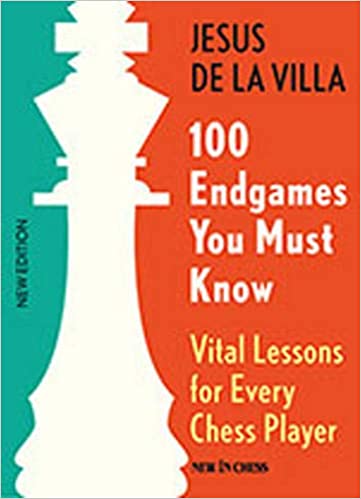
100 Endgames You Must Know, by Jesús de la Villa
This is a classic and one of the best chess books for beginners. It has been edited and updated a few times, only to reach perfection. The author begins with an important statement. Endgames are always different. Sure, there are a few types of endings you should know by heart, but other than that, you will have to adapt. Once you have these endings on your mind, your expertise will never go out of date, so you will always be on top of your opponent.
On a different note, many players lack such endgame techniques. They find themselves in advantage and it looks like they are winning, but they mess it up at the end. Furthermore, those who play against the time do it even worse because they are pressured. They simply do not have the time to plan their next moves and anticipate the opponent’s moves. This is when the necessity of a good endgame technique kicks in – you want to be in control at all times.
This book features some of the most common endgames you will have to deal with. It will take you through the most common situations out there. They are well explained and relatively simple to learn, yet it takes time to implement them accordingly – practice is mandatory. They also come with a few useful ideas that will prove to be handy in difficult situations. Apart from all these, there are a bunch of diagrams, summaries and tests to help you learn the techniques and become a better player.
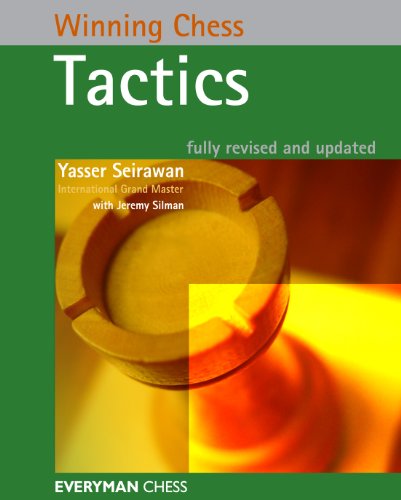
Winning Chess Tactics, by Yasser Seirawan
This book comes from one of the top players in the USA and not only. It is suitable for beginners who already know all the moves and have a bit of experience with random techniques. After a while though, you do need to develop your tactics a bit. You need to understand how things go. Fail to do so and you will end up with some bad habits that are bad to fix later on. Plus, this is the optimal way to take your experience to another level.
The book is only an introduction to these tactics. It is instructive and constructive and will work wonders for every amateur out there. It is written in a fun way that will make things crystal clear straight away. Everything is explained in small details and with easy words, so no chess experience is required to figure it out. Believe it or not, even more advanced players can learn a few things from it – after all, it comes from a top chess player with a proven reputation.
Once inside the book, you will find lively instructions, as well as scores. Everything is explained with examples and not randomly – no guesswork involved. You can learn about critical maneuvers in tactical positions, as well as over 200 diagrams to help you understand. The book also analyzes some of the best tacticians in the world, their moves and mindsets when making certain decisions, so it is totally worth your time.
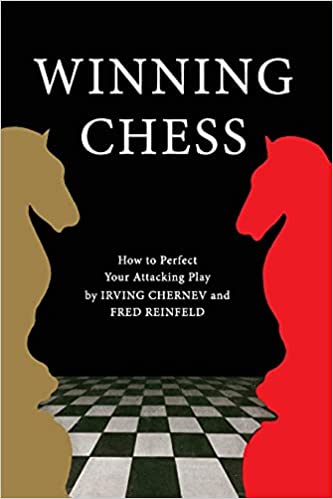
Winning Chess, by Fred Reinfeld and Irving Chernev
Winning Chess is a timeless masterpiece. Initially released in 1970, the book has been edited a few times to implement some of the most modern and advanced techniques in today’s chess. The book has been widely embraced by chess masters all over the world and makes a great book for beginners who know a bit about the game. In other words, this is not a guide for someone who has never seen a chess board before.
You do not have to be an expert to implement these techniques. Instead, adapt them to what you already know and everything will become surprisingly easier. The book comes from two popular chess players and authors, so you know for a fact that you are learning from the best. It is written in a fun and lively manner – a conversational style that makes it easy to understand. There will be certain parts that will put a smile on your face, as well as more serious parts that require a bit of thinking.
The authors recommend letting your imagination go wild a little. It is not the type of book that will teach you solutions to be implemented by the book. Instead, you are free to use your mind, stimulate yourself and adopt a few chess principles that can help you anticipate your opponents’ moves in a more efficient manner. Finally, this masterpiece aims to make chess a fun game. It is not a technical manual, but a type of book that will help you love chess even more and play it in a fun manner.
Conclusion
As a short final conclusion, these are some of the best chess books for beginners out there. Indeed, the list can be longer than that, but these manuals will help you master the game, develop your own techniques and discover some principles that many amateurs are not aware of. Each of these books is written in a fun way that will make chess more accessible and easier to understand.
